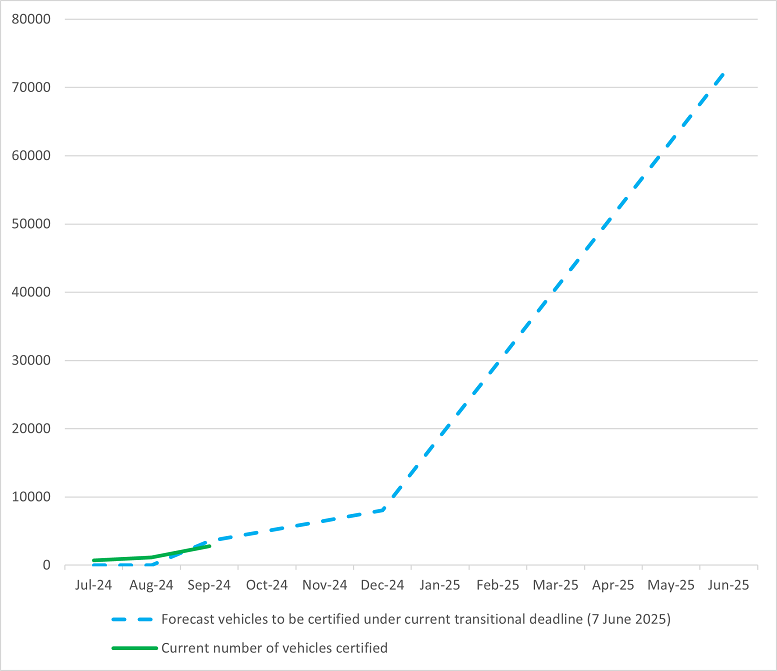Key considerations
We have identified several things that should be considered when deciding whether to extend the transitional period.
On this page
Impact on local authorities, communities and the environment
The Act is intended to increase public trust in the self-contained vehicle system and reduce the environmental impacts of vehicle-based freedom camping.
Local authorities and communities deal with the consequences of environmental harm and clean-up costs from freedom camping, particularly in regions with high levels of freedom camping. If period 4 is extended, then the benefits of the Act for these communities will be delayed.
Impact on vehicle owners
Vehicle owners may be impacted by a change to the transitional period or by not changing it. Under the status quo transitional period, there is likely to be an increased impact on vehicle owners with greater demand on Certification Authorities and a potential flow-on effect for vehicle inspection fees. Unlike the vehicle levy, these fees are not paid to the government but to the Certification Authority to cover the work involved with an inspection. Extending the transitional period may alleviate this impact. There is also the potential for the vehicle levy to be increased when the levy rate is formally reviewed because of changes to the transitional period, which would be passed on to individual vehicle owners (see specific section on this below).
Certification capacity
A self-contained motor vehicle must be inspected by a vehicle inspector[1] who works on behalf of a Certification Authority in order to be certified as self-contained under the Act. To increase the capacity of the system during the transitional period, certifying plumbers were automatically deemed to be Certification Authorities until 6 June 2025[2]. We have previously estimated that 73,000 vehicles will need to be inspected, of which approximately 5,000 are rental vehicles.
As of 1 October 2024:
- 13 Certification Authorities have been appointed by the PGDB.
- 46 certified plumbers have been given access to and are actively certifying vehicles in the PGDB’s self-contained motor vehicle register.
- 508 vehicle inspectors have been given access to the PGDB’s self-contained motor vehicle register.
- 3,592 vehicles have been issued with a new green certificate of self-containment (2,115 rental and 1,477 private).
A range of factors are likely to have caused this low uptake. This includes people deciding not to transfer from their blue warrants until closer to the end of the transitional period, the relatively small number of Certification Authorities being operational during this period, and the sector waiting for greater certainty about other changes to the Regulations (changes to the Regulations in relation to direct venting came into force on 29 August 2024).
From January 2025, approximately 11,000 vehicles per month will need to be certified
Graph 1 shows the number of currently certified vehicles against the number forecast to be required to be certified within the current transitional period. This forecast assumes that the estimated 5,000 self-contained rental motor vehicles will be the focus of Certification Authorities ahead of the deadline on 7 December 2024. From January 2025 onwards, 10,827 vehicles will need to be certified per month (68,000 total) to certify the full national fleet. This is shown below (an even distribution has been assumed within each month of the current transitional period).
Graph 1: Forecasted rate of vehicle certification under the current transitional period

View graph description and data
Funding of the Plumbers, Gasfitters, and Drainlayers Board
The self-contained vehicle system is designed to be self-funded with the cost of the PGDB being fully covered by levies paid by vehicle owners getting their vehicles certified self-contained. The initial operations of the PGDB have been funded by the Government, until sufficient levies are generated. There is an expectation that this funding will then be repaid. Currently, the levy revenue is forecast to generate slightly more revenue over a 4-year period (roughly $25,000) than the PGDB’s forecasted operating costs.
One possible consequence of any extension to the transitional period is that vehicle owners delay getting their vehicles certified until close to the new deadline. This could mean that current levy revenue is not sufficient to meet the costs of the PGDB for a longer period, requiring further Government funding. As a consequence, it is possible that:
- the self-contained vehicle levy may need to be increased, which becomes more likely under a longer transitional period, and/or
- the PGDB’s operating budget will need to be reduced, which may impact its ability to support Certification Authorities, carry out compliance monitoring activities, and carry out stakeholder engagement and awareness raising activities.
There is uncertainty about when and how many vehicles will become certified and when Government funding will be repaid; therefore, we are unable to provide more detailed information at this time. Any future increase to the self-contained vehicle levy would follow a process similar to this consultation.
Footnotes
[1] Means a person appointed as a motor vehicle inspector in accordance with section 87T of the Plumbers, Gasfitters, and Drainlayers Act 2006.
[2] The status of certifying plumbers as deemed Certification Authorities will end on 6 June 2025 regardless of whether or not the transitional period for privately owned vehicles is extended.

